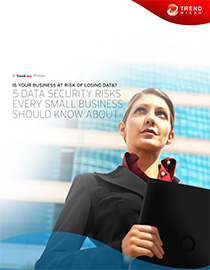5 Data Security Risks Small Businesses Should Be Aware Of
 View primer: 5 Data Security Risks Small Businesses Should Be Aware Of
View primer: 5 Data Security Risks Small Businesses Should Be Aware Of
Companies, regardless of size, rely on critical business data in order to succeed and flourish. What would happen to their business if they lost sensitive information? Based on a Trend Micro-sponsored Ponemon Institute study, more than 78% of organizations have suffered from at least one data breach over the past two years.
Regardless of who’s responsible for the loss of data—negligent employees or other insiders, or those with malicious intent—unless an organization has the necessary knowledge and skills to protect and recover lost data, data breaches will continue to be a problem.
Organizations may face insurmountable financial liabilities if they lose sensitive data. Data breaches can result in direct costs such as reimbursement to customers and data recovery costs. Companies may, for instance, face the inevitable task of recreating lost data from scratch after a breach occurs. Even worse is the damage to one’s reputation, especially since most consumers—their customers—said they would entirely stop dealing with an organization in the event of a security breach.
In line with the data threats that small and medium-sized businesses (SMBs) face, we’ve come up with five reasons why an organization may be on the brink of a data breach, as well as tips on how to help protect companies and businesses from data breaches.
Like it? Add this infographic to your site:
1. Click on the box below. 2. Press Ctrl+A to select all. 3. Press Ctrl+C to copy. 4. Paste the code into your page (Ctrl+V).
Image will appear the same size as you see above.
Recent Posts
- Estimating Future Risk Outbreaks at Scale in Real-World Deployments
- The Next Phase of Cybercrime: Agentic AI and the Shift to Autonomous Criminal Operations
- Reimagining Fraud Operations: The Rise of AI-Powered Scam Assembly Lines
- The Devil Reviews Xanthorox: A Criminal-Focused Analysis of the Latest Malicious LLM Offering
- AI Security Starts Here: The Essentials for Every Organization

 Complexity and Visibility Gaps in Power Automate
Complexity and Visibility Gaps in Power Automate AI Security Starts Here: The Essentials for Every Organization
AI Security Starts Here: The Essentials for Every Organization The AI-fication of Cyberthreats: Trend Micro Security Predictions for 2026
The AI-fication of Cyberthreats: Trend Micro Security Predictions for 2026 Stay Ahead of AI Threats: Secure LLM Applications With Trend Vision One
Stay Ahead of AI Threats: Secure LLM Applications With Trend Vision One